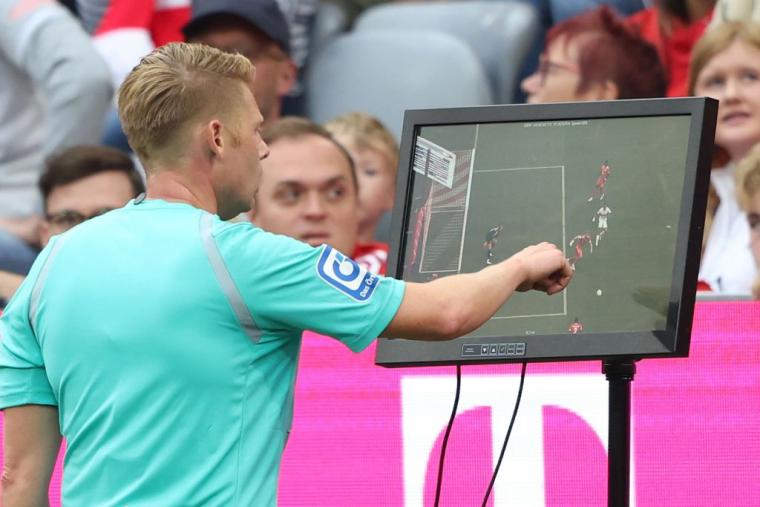Premier League clubs are set to hold a vote at their annual general meeting next month on a proposal to abolish the video assistant referee (VAR) system from the start of next season.
VAR has been used in the English top-flight since 2019, helping improve decision making but also generating persistent controversy.
The 2023-24 campaign has featured many contentious incidents, which has heightened the criticism of VAR and led some teams and fans to question the competition’s integrity.
A resolution has now been formally submitted to the Premier League by Wolverhampton Wanderers calling for VAR to be scrapped this summer — and that will trigger a vote when representatives of the 20 clubs assemble for their yearly gathering, in Harrogate on June 6.
A Wolves statement said the move came “after careful consideration and with the utmost respect for the Premier League, (referees body) PGMOL and our fellow competitors.
“There is no blame to be placed — we are all just looking for the best possible outcome for football — and all stakeholders have been working hard to try and make the introduction of additional technology a success.
“However, after five seasons of VAR in the Premier League, it is time for a constructive and critical debate on its future.
“Our position is that the price we are paying for a small increase in accuracy is at odds with the spirit of our game, and as a result we should remove it from the 2024/25 season onwards.”

Wolves submitted the resolution to the Premier League (Shaun Botterill/Getty Images)
A Premier League spokesperson said: “The Premier League can confirm it will facilitate a discussion on VAR with our clubs at the annual general meeting next month.
“Clubs are entitled to put forward proposals at shareholders’ meetings and we acknowledge the concerns and issues around the use of VAR.
“However, the league fully supports the use of VAR and remains committed, alongside PGMOL, to make continued improvements to the system for the benefit of the game and fans.”
Wolves accepted the decision to introduce VAR was “made in good faith and with the best interests of football and the Premier League at its heart” but argued it has caused “numerous unintended negative consequences that are damaging the relationship between fans and football, and undermining the value of the Premier League brand”.
They listed a host of repercussions, such as:
- Impact on goal celebrations and the spontaneous passion that makes football special
- Frustration and confusion inside stadiums due to lengthy VAR checks and poor communication
- A more hostile atmosphere with protests, booing of the Premier League anthem and chants against VAR
- Overreach of VAR’s original purpose to correct clear and obvious mistakes, now overanalysing subjective decisions and compromising the game’s fluidity and integrity
- Diminished accountability of on-field officials, due to the safety net of VAR, leading to an erosion of authority on the pitch
- Continued errors despite VAR, with supporters unable to accept human error after multiple views and replays, damaging confidence in officiating standards
- Disruption of the Premier League’s fast pace with lengthy VAR checks and more added time, causing matches to run excessively long
- Constant discourse about VAR decisions often overshadowing the match itself, and tarnishing the reputation of the league
- Erosion of trust and reputation, with VAR fuelling completely nonsensical allegations of corruption
VAR has again been at the centre of multiple high-profile flashpoints in the past nine months.
Liverpool’s Luis Diaz saw a goal wrongly disallowed for offside against Tottenham Hotspur in September before Arsenal manager Mikel Arteta was left angered by the decision to allow Anthony Gordon’s winning goal to stand for Newcastle United against his side in November.
Nottingham Forest have written letters of complaint to — and considered suing — PGMOL, while also questioning the appointment of VAR Stuart Attwell following April’s defeat at Everton.

Diaz’s disallowed goal was one of a number of incidents (Marc Atkins/Getty Images)
IFAB (International Football Association Board), the independent body responsible for the laws of the game, states that VARs can only assist a match official in the event of a “clear and obvious error” or “serious missed incident”.
They can step in on decisions over goals, no goals, penalties, direct red cards or cases of mistaken identity.
Sweden last month became the first country to reject implementing VAR after a fan backlash.
Supporters from clubs — where there must be a minimum of 51 per cent fan-ownership — prompted the climbdown after the president of the Swedish Football Association, Fredrik Reinfeldt, had previously backed the idea.
Premier League clubs have a constitutional right to put forward rule changes, with any proposal needing a two thirds (14-6) majority to pass.
The top-flight’s board of directors believes removing VAR is not the correct path forward, suggesting that doing so would increase wrong calls and adversely impact the Premier League’s reputation among Europe’s leading divisions.
It also thinks the void left, having removed VAR, would potentially place even greater criticism on on-field decisions made by match officials and increase frustration for supporters.
The league points to innovations such as semi-automated offside technology (SAOT) — which was voted through unanimously in April — and in-stadium VAR announcements as evidence of the efforts being made to improve the system.
Since VAR was brought in five years ago, the number of correct decisions made in games has increased from 82 per cent, prior to its introduction, to 96 per cent this season.
Has VAR worked in the Premier League?
By Phil Buckingham
The Premier League’s bumpy marriage to VAR began with a proposal in 2018. There was optimism on the back of its successful roll-out at a World Cup staged in Russia earlier that year, enough for the Premier League’s 20 clubs to turn their previous scepticism into a unanimous backing for VAR to be introduced for 2019-20.
England’s top-flight had been the last of Europe’s big five leagues to adopt VAR, initially rejecting its use in April 2018 owing to concerns over how decisions would be communicated.
A two-thirds majority, which equates to the backing of 14 clubs, is required for any of the Premier League’s rules to be amended and that eventually came with a vote in favour of VAR, pending advanced tests, six years ago.
A fifth Premier League season using VAR is now drawing to a close and it was claimed by Tony Scholes, the Premier League’s chief football officer, that 96 per cent of decisions made are now correct. Scholes also said in March that the “majority” of supporters were still in favour of VAR, despite an acceptance that checks were taking too long and communication with fans had its flaws.
There has been no suggestion of the Premier League turning back on technology until now, with automated offsides due to be introduced to help hone an often protracted process next season.
VAR has become part of elite football but there is one outlier. Sweden’s top division, Allsvenskan, has opposed the use of technology with 18 of the top 32 clubs rejecting its introduction last month.
Swedish football had been proposing trials later this year but those will not now go ahead.
“Sweden is currently the only country among Europe’s 30 highest-ranked leagues that has not decided to introduce VAR,” said Johan Lindvall, general secretary of the Swedish Professional Football Leagues. “The fact that we have not done so is largely due to our democratic model.”
Swedish clubs are predominantly fan-owned and VAR remains deeply unpopular with those supporters.







